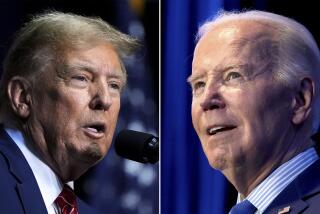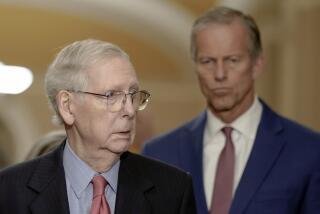Analysis: Trump won the nomination by harnessing anger. Can he now turn to a message of optimism?
Donald Trump won the Republican nomination by harnessing the dour mood of GOP voters put off by the nation’s political class. Now, as he turns to the general election, he faces the challenge of incorporating something he has mostly omitted to this point — an overarching, positive vision for the country.
His best opportunity to date will come during his Thursday night convention address. Hillary Clinton will have the same opportunity — and the same demand--one week later.
For Trump and his fellow Republicans, crafting an appealing argument requires a deft touch. They must persuade even parts of the country that have benefited under President Obama that what they say would be his third term — under Clinton — would be untenable. That requires a heavy dose of negativity.
But history suggests that shifting gears toward an upbeat message is also a necessity.
“What voters want is a message of optimism — an upbeat, positive message that tells them, to use the words of a past candidate: Americans, better days are ahead,” said G. Terry Madonna, a veteran pollster in Pennsylvania, a state targeted by Trump this fall but reliably Democratic for two decades.
“A sense of optimism, ebullience, that says, ‘Yes, things are tough but we can solve them,’” Madonna said.
Other Republicans, particularly those running in Senate and House races, have been anxious to distance themselves from Trump’s mien and emphasize their own, different viewpoint.
On Tuesday night, House Speaker Paul D. Ryan of Wisconsin, who only belatedly endorsed Trump and has upbraided him more than once for damaging remarks, tried to inject a sense of optimism into the convention. Ryan has sought to make clear that members of Congress have different priorities than their nominee.
He continued that effort Tuesday night, offering a bit of self-deprecation about how “things didn’t work out quite according to plan” after the last time he was onstage as the 2012 vice presidential nominee.
“But hey, I’m a positive guy,” he said. He offered a lengthy critique of Democrats but followed it with an equally lengthy list of Republican desires that he cast in uplifting terms.
“By the true measure we are all neighbors and countrymen, called — each one of us — to know what is right and kind and just, and to go and do likewise,” he said. “Everyone is equal, everyone has a place, no one is written off, because there is worth and goodness in every life.”
Ryan also offered what could be read as a warning to Trump.
“We know better than most — we know better than to think that Republicans can win only on the failures of Democrats,” he said. “It still comes down to the contest of ideas. Which is really good news, ladies and gentlemen, because when it’s about ideas, the advantage goes to us.”
Senate Majority Leader Mitch McConnell of Kentucky, who is trying to prevent Trump-related losses of seats in Congress’ upper house, added a less lyrical, but still specific, list of Republican policy goals. Alabama Sen. Jeff Sessions joined the effort, describing Trump in his remarks as a man who “is positive by nature.”
But over the convention’s first two days, many of the attendees and speakers have hewed to pessimism — often with an apocalyptic tone.
Speakers on Monday and Tuesday condemned the state of the country — Obama and Clinton in particular— in harshly negative terms.
On both days, Republicans spent hours talking about Clinton’s role in the 2012 attack on the U.S. mission in Benghazi, Libya, and Clinton’s uses of a private email system. Both are issues of high importance to conservatives and Republican regulars, but have presumably already exacted whatever political punishment they possess on Clinton.
The first night of the convention was supposed to highlight how to “Make America Safe Again,” and Tuesday’s theme was to be “Make America Work Again.” In reality, the two nights were indistinguishable as speakers and delegates delivered blistered accusations and repeated grievances against Democrats.
Sharon Day, co-chairwoman of the Republican National Committee, said Clinton had “viciously attacked the character of women who were victims of sexual abuse at the hands of her husband,” referring to unproven claims against Bill Clinton.
Chris Cox, executive director of the National Rifle Assn.’s lobbying arm, warned the delegates that “we live in dangerous times,” casting access to guns as the solution.
Former candidate Ben Carson suggested that Clinton was influenced by a follower of Lucifer.
The epitome came when New Jersey Gov. Chris Christie offered a fierce — and in some cases inaccurate — condemnation of Clinton’s actions as secretary of State.
He cast the crowd as her jury, asking delegates over and over for a verdict.
“Guilty!” they yelled, adding chants of “Lock her up!” while they held their wrists together to mimic handcuffs.
Placating Republicans energized by that display, as well as other voters seeking a broader understanding of what Trump would bring to the White House, is a challenge for the nominee.
Throughout his campaign, Trump has been caustic and bleak in his assessments of the country, castigating his opponents, existing officeholders and negotiators as “stupid.” As the nation reeled in recent weeks over shootings of Americans by police, and later the multiple shootings of police, Trump asserted that the world was spinning apart and that nearly a dozen cities were on the verge of exploding.
Trump’s fans are receptive to those arguments, as his nomination shows. A recent Suffolk University poll of likely voters asked whether in the last five to 10 years respondents felt more safe or less. Overall, 54% said less safe. But among Republicans, 76% said they felt less safe. Among other voters Trump will need to win the presidency, fewer than half took that view.
That suggests Trump’s problem: He has to maintain his often bleak rhetoric to engage and motivate his core voters while somehow also attracting others.
“It’s really unfortunate that this is such a negative campaign,” said Republican pollster Kristen Soltis Anderson.
She said Trump has a negative message “that’s tailor-made for places where opportunity has left,” such as the Rust Belt. But, she said, the message isn’t enough in the Sun Belt, where the economy has improved — and where many important electoral states lie.
The first two days of the convention have failed to focus on those voters, pollster Madonna said.
“There’s nothing wrong with him talking about the problems, but he has to have a path to solve them,” he said. “Saying ‘Crooked Hillary’ does not provide voters with a solution.”
On the highest-profile stage he will occupy until fall’s presidential debates, Donald Trump now has two days left to offer that solution.
Staff writer David Lauter contributed to this report.
Twitter: @cathleendecker
ALSO:
Day 1 of Donald Trump’s convention: Scattered in message, unruly in delivery
Donald Trump impugns President Obama on race, then agrees with him
As violence cuts into GOP convention, Trump under pressure to hew to safety message
More to Read
Get the L.A. Times Politics newsletter
Deeply reported insights into legislation, politics and policy from Sacramento, Washington and beyond. In your inbox three times per week.
You may occasionally receive promotional content from the Los Angeles Times.







